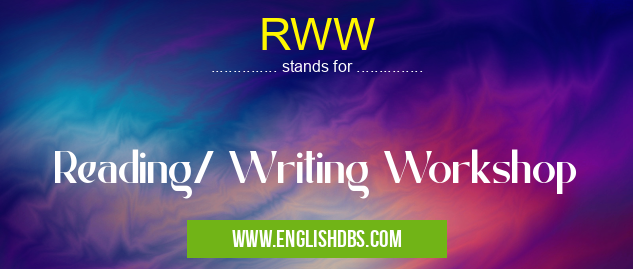What does RWW mean in EDUCATIONAL
Reading/ Writing Workshop (RWW) is an approach to teaching literacy that focuses on the development of both reading and writing skills in students. It emphasizes active student engagement with the text and encourages collaboration between students and their teachers to develop a shared understanding of the material. RWW provides meaningful learning opportunities by creating an interactive classroom environment where students can explore their interests, practice their skills, and discuss topics with their peers. By focusing on the development of literacy, RWW provides a comprehensive approach to teaching language arts which helps students become successful readers and writers.

RWW meaning in Educational in Community
RWW mostly used in an acronym Educational in Category Community that means Reading/ Writing Workshop
Shorthand: RWW,
Full Form: Reading/ Writing Workshop
For more information of "Reading/ Writing Workshop", see the section below.
» Community » Educational
Essential Questions and Answers on Reading/ Writing Workshop in "COMMUNITY»EDUCATIONAL"
What is Reading/Writing Workshop?
Reading/Writing Workshop (RWW) is an instructional approach to teaching literacy skills composed of mini-lessons, conferring with individual students, and focused independent work. RWW helps learners understand the reading and writing process as they explore different texts or writing topics.
Who benefits from RWW?
RWW provides tools for all learners whether they are advanced or struggling readers and writers. It helps students develop their literacy skills by providing them with strategies to better comprehend texts, write effectively, and practice on their own.
How often do Reading/Writing Workshop classes take place?
Depending on the school, the frequency may vary in terms of how often RWW classes are offered. Generally speaking, most schools offer one or two weekly classes that last for 45-55 minutes each.
What kind of activities can be done in RWW classes?
Activities that can be done during class may vary depending on the teacher; however, common activities include mini-lessons on different topics related to reading or writing, sharing stories/writing pieces among peers for peer feedback and editing, focused independent practice sessions among others.
What subjects are typically covered in a Reading/Writing Workshop Class?
Subjects commonly explored during a RWW class include literature analysis, grammar rules/conventions, story structure elements (plot line etc.), storytelling techniques and creative writing strategies such as plot creation and characterization.
Are there any assessment methods used in RWW classes?
Yes! Assessment plays an important part in observing student growth during a reading/writing workshop class; thus teachers usually use a variety of methods such as anecdotal notes taken while observing their students during reading or writing activities, rubrics to grade assignments and portfolios with multiple samples of student writing that help determine areas where improvement is needed among other methods.
Is there a specific curriculum used for each RWW class?
While some teachers prefer following one specific curriculum for their entire course; others mix and match different resources according to student needs or interests and adapt accordingly using diverse material such as books from libraries or online sources along with educational games whenever possible.
What resources do I need to become an effective RWW teacher?
To ensure success when teaching through the Reading/Writing Workshop model it might be helpful to have knowledge about differentiated instruction strategies along with a wide range of accessible materials such as websites that provide free printables and links to online videos & resources related to literacy education among other teaching aids like anchor charts or task cards. Additionally having good classroom management skills is key when working in small group settings; thus preparation is very important here!
What sort of support does a teacher need when first implementing the Reading/Writing Workshop approach in their classroom?
At first it can be overwhelming trying out a new methodology so having mentorships with experienced teachers who already successfully use this approach can be really beneficial when getting started as they can provide lots of advice about best practices as well as tips on how to design engaging lessons tailored towards specific student needs under this framework.
Final Words:
Reading/ Writing Workshop (RWW) is a comprehensive approach to language arts education that emphasizes active student engagement with texts as well as collaboration between teachers and students. By providing individuals with strong foundations in both reading comprehension and writing composition it can also benefit communities at large by boosting literacy levels among its members while also equipping them with critical thinking skills for further success later on down the road. Thus RWW offers significant advantages to both individuals and communities alike allowing them to become better informed citizens who can actively engage in important conversations about topics related to social justice or other pressing issues facing society today.
